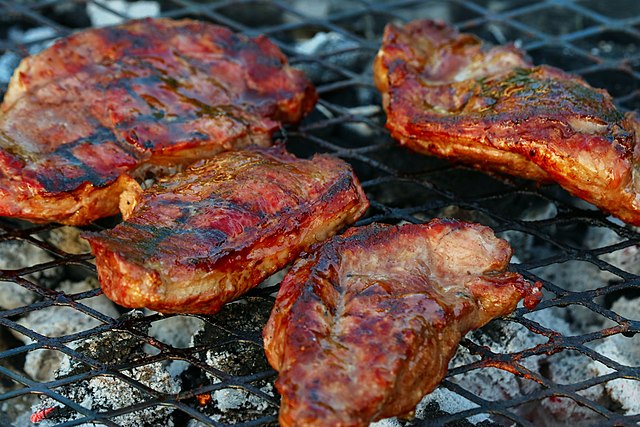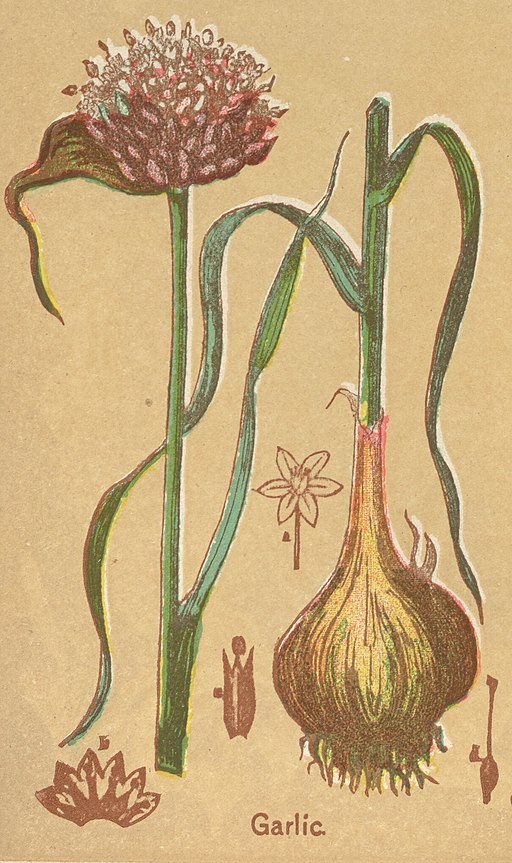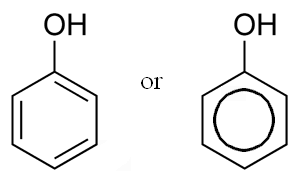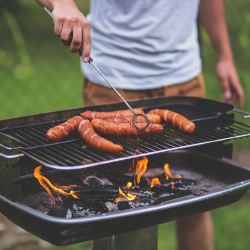It’s summertime when we fire up our grills and move the cooking outdoors. Whether you use charcoal, propane, or wood as your fuel, scientists have linked the high-temperature cooking of meats to the formation of potential human carcinogens. This may cause some to pause and ask, “Are charred meats safe to eat?” While the long-term effects of consuming grilled meats remain debatable, some methods will help lower potential cancer-related compounds and improve the flavor and juiciness of your burnt offerings.
What are Heterocyclic Amines and Polycyclic Aromatic Hydrocarbons?
 Heterocyclic amines (HAs) and polycyclic aromatic hydrocarbons (PAHs) form in meats when cooked at high temperatures for a long duration with low moisture. Thermal processes such as roasting, grilling, frying, and barbecuing meet these requirements. Nine HAs and 15 PAHs have been associated with binding to DNA, inducing cellular mutations, and the development of cancer.
Heterocyclic amines (HAs) and polycyclic aromatic hydrocarbons (PAHs) form in meats when cooked at high temperatures for a long duration with low moisture. Thermal processes such as roasting, grilling, frying, and barbecuing meet these requirements. Nine HAs and 15 PAHs have been associated with binding to DNA, inducing cellular mutations, and the development of cancer.
In response to reports of carcinogens in barbecue, a group of scientists in Brazil, where the average citizen eats around 42 kilograms (93 lbs) of meat per year, conducted a meta-analysis of peer-reviewed scientific articles published between 1997 and 2019, looking at different methods to reduce the formation of HAs and PAHs in beef, chicken, and pork.
Researchers looked at garlic, onion, peppers, and phenolic compound-containing spices to see if adding these ingredients reduced HAs and PAHs. What they found was encouraging.
The Spice Effect – Adding Flavor and Protection
Spices enhance the flavor and aroma of meats. According to the meta-analysis, spicing before frying, grilling, or roasting significantly reduces the presence of HAs and PAHs.
 Many cultures use onion and garlic to season meats. Several studies found that adding fresh onion and garlic to meats reduced the formation of HAs and PAHs. In one study, onion at a 30% concentration in relation to meat weight lowered the formation of HAs and PAHS by roughly 25 to 50%. A smaller amount of garlic reduced PAHs by 54% in meats.
Many cultures use onion and garlic to season meats. Several studies found that adding fresh onion and garlic to meats reduced the formation of HAs and PAHs. In one study, onion at a 30% concentration in relation to meat weight lowered the formation of HAs and PAHS by roughly 25 to 50%. A smaller amount of garlic reduced PAHs by 54% in meats.
The scientists theorized that these ingredients make the meat structure more resistant to thermal decomposition. These tasty bulbs contain organosulfur compounds, quercetin in onion, and allicin in garlic, with antioxidant activity suppressing damaging reactive oxygen species.
Pepper
Red and black pepper contain capsaicin and piperine, respectively. These compounds not only lend non-thermal ‘heat’ to meats but have antioxidant activities. Scientists found that adding only 0.5% Sichuan pepper to grilled beef reduced HAs by between 28% and 82%. Black and red pepper were both tested in varying amounts in roasted meat. Surprisingly, a more significant reduction of HAs was found at the lowest levels (0.5%), proving that more isn’t always better.
Why might that be the case? In high concentrations, some bioactive compounds found in these spices, as well as ginger, star anise, and fennel, will degrade during high-temperature cooking – oxidizing and forming undesirable compounds. Another negative: pepper at a higher concentration of 1.5% resulted in ‘tougher’ meat, perhaps by inducing water loss.
Phenolic Spices
 Rosemary, turmeric, powdered onion, oregano, cumin, lemongrass, and curry leaves also reduced the formation of total HAs in grilled meats, possibly due to the presence of phenolic compounds or phenols - aromatic (ring) structures and one or more hydroxyl (-OH) groups. Plants and microorganisms naturally produce phenols. They are highly reactive, interacting with other compounds to achieve a lower stability or energy state. In practice, they scavenge reactive oxygen species, those damaging molecules formed during high-temperature cooking, rendering them harmless. As a bonus, adding these spices improved the color and flavor of grilled meat samples, resulting in higher acceptance scores among taste panels. Other ingredients which successfully reduced HAs and PAHs were olive oil, vinegar, wine, beer, lemon, lime, artichoke extracts, cherry, apple peel, grape, and pomegranate seeds. All seem to contain bioactive compounds or add moisture, aiding in inhibiting HAs and PAHs.
Rosemary, turmeric, powdered onion, oregano, cumin, lemongrass, and curry leaves also reduced the formation of total HAs in grilled meats, possibly due to the presence of phenolic compounds or phenols - aromatic (ring) structures and one or more hydroxyl (-OH) groups. Plants and microorganisms naturally produce phenols. They are highly reactive, interacting with other compounds to achieve a lower stability or energy state. In practice, they scavenge reactive oxygen species, those damaging molecules formed during high-temperature cooking, rendering them harmless. As a bonus, adding these spices improved the color and flavor of grilled meat samples, resulting in higher acceptance scores among taste panels. Other ingredients which successfully reduced HAs and PAHs were olive oil, vinegar, wine, beer, lemon, lime, artichoke extracts, cherry, apple peel, grape, and pomegranate seeds. All seem to contain bioactive compounds or add moisture, aiding in inhibiting HAs and PAHs.
Cooking Techniques
Marinades increase the juiciness of grilled meats because they add moisture from water or oil. Because most marinades contain a complex list of ingredients, including spices, it was difficult to access the effectiveness of oil and water alone. However, higher moisture content did reduce the meat’s surface temperature. It enhanced the sensory characteristics of the cooked meat—the addition of salt reduced water loss and HA and PAH formation.
Cooking reduces the microbial load and enhances the safety of meats. The USDA recommends minimal internal temperatures of 145⁰F for safe consumption of beef, pork, veal, and lamb. But high temperature is the main factor in forming HAs and PAHs. Scientists in this meta-analysis suggested using lower temperatures, between 70 to 180⁰C (158 to 356⁰F), and turning the meat more often to reduce contact time with hot surfaces.
Barbecue grills allow fatty residues from the meat to drip down and sizzle on the charcoal below, creating smoke that rises back over the meats. The smoke contains the carcinogens formed on the charcoal and deposited on the meat’s surfaces. Cooking over indirect heat or using coconut shell charcoal instead of traditional wood charcoal will reduce flame and smoke. [1]
So, reduce the heat, turn the meat and pass the garlic. Use these tasty, timely science-based suggestions to increase the flavor of your barbecue while reducing unwanted guests on the meat at your family cook-out.
[1] Edward Kingsford was a friend of Henry Ford, whose new model T car required about 100 board feet of wood. Kingsford was in the timber business and provided the wood to Ford, eventually becoming a Ford executive. Meanwhile, Ford, concerned over the growing piles of wood scraps, asked another of his friends, Thomas Edison, to find a solution. Edison built a plant that turned those wood scraps into charcoal, Kingsford Charcoal.
Source: Effects of seasoning on the formation of heterocyclic amines and polycyclic aromatic hydrocarbons in meats: A meta-analysis. Comprehensive Review of Food Science and Food Safety DOI: 0.1111/1541-4337.12650
Images are from Wikipedia used under the Creative Commons License

